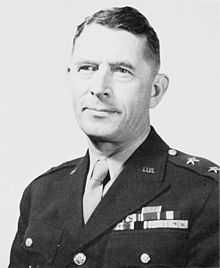Ralph C. Smith
| Ralph Corbett Smith | |
|---|---|
 | |
| Born |
November 27, 1893 South Omaha, Nebraska |
| Died |
January 21, 1998 (aged 104) Palo Alto, California |
| Allegiance |
|
| Service/branch |
|
| Years of service | 1916–1948 |
| Rank |
|
| Commands held |
|
| Battles/wars | |
| Awards |
Silver Star with an Oak-Leaf Cluster Purple Heart |
Ralph Corbett Smith (November 27, 1893 – January 21, 1998) was a highly decorated Major General of the United States Army. After receiving early training as a pilot from Orville Wright he served General John J. Pershing's army against Pancho Villa, became decorated for bravery in World War I and commanded an infantry division in combat in the Pacific in World War II. At his death Smith was the oldest surviving general officer of the Army.[1]
Early life
Born in Nebraska, Smith attended Colorado State College and served in the Colorado National Guard. He was an early aviator and was given flying lessons, as a young officer, by Orville Wright, and his pilot's license, signed by Wright, bore the number 13 because he was the 13th person to receive one.
Military career
He was commissioned a second lieutenant in the Army in 1916 and was involved in the Army's unsuccessful Mexican Punitive Expedition, whose commanding general was John J. Pershing, against Pancho Villa just before the United States entered World War I.
In the first world war Smith won the Silver Star with an Oak-Leaf Cluster for two instances of bravery with the Infantry in France. He was wounded in action in the Meuse-Argonne offensive in 1918. Between the world wars his duties including teaching at West Point and attending, and then instructing, at the Command and General Staff School at Fort Leavenworth, Kansas.
He was a temporary Colonel when the United States entered World War II. In 1942, he became a Major General and took command of the 27th Infantry Division (United States). In 1943, troops of his division captured Makin Atoll in the Gilbert Islands in the Pacific, which became the first central Pacific island to be reconquered by the Allies.
In 1944, the general's division took part in the hard struggle for the mountainous island of Saipan in the western Pacific during which he was relieved of his command by Lieutenant General Holland M. Smith of the U.S. Marine Corps, commander of the V Amphibious Corps. Marine General Smith contended that under Army General Smith the 27th Division had "failed to attack on time," costing vital Marine lives to save the island.[2]
An all-Army board of inquiry later exonerated the Major General, and he went on to serve as the military attache at the United States Embassy in Paris and CARE's chief of mission for France. While he worked for CARE he also oversaw operations in other western European countries.
Smith retired from the Army in 1948.
After retirement
General Smith was a fellow at Stanford University's Hoover Institution on War, Revolution and Peace.
He died in 1998 of a lung ailment.
Personal life
His first wife, Madeleine, died in 1975.
In 1980, he remarried, to Hildy Jarman, she died in 1995.
References
- ↑ Pace, E. (1998) " Gen. Ralph C. Smith, Honored For War Bravery, Dies at 104", The New York Times. January 26, 1998. Retrieved 5/9/08.
- ↑ "The Generals Smith", TIME Magazine. September 18, 1944. Retrieved 5/9/08.
Additional reading
- Goldberg, Harold J. (2007). D-day in the Pacific: The Battle of Saipan. Indiana University Press. ISBN 0-253-34869-2.
- Hyperwar The War in the Pacific. Campaign In the Marianas
- Smith v. Smith
- Howlin' Mad Vs. the Army: Conflict in Command, Saipan 1944
- Ralph Corbett Smith papers, Hoover Institution Archives,